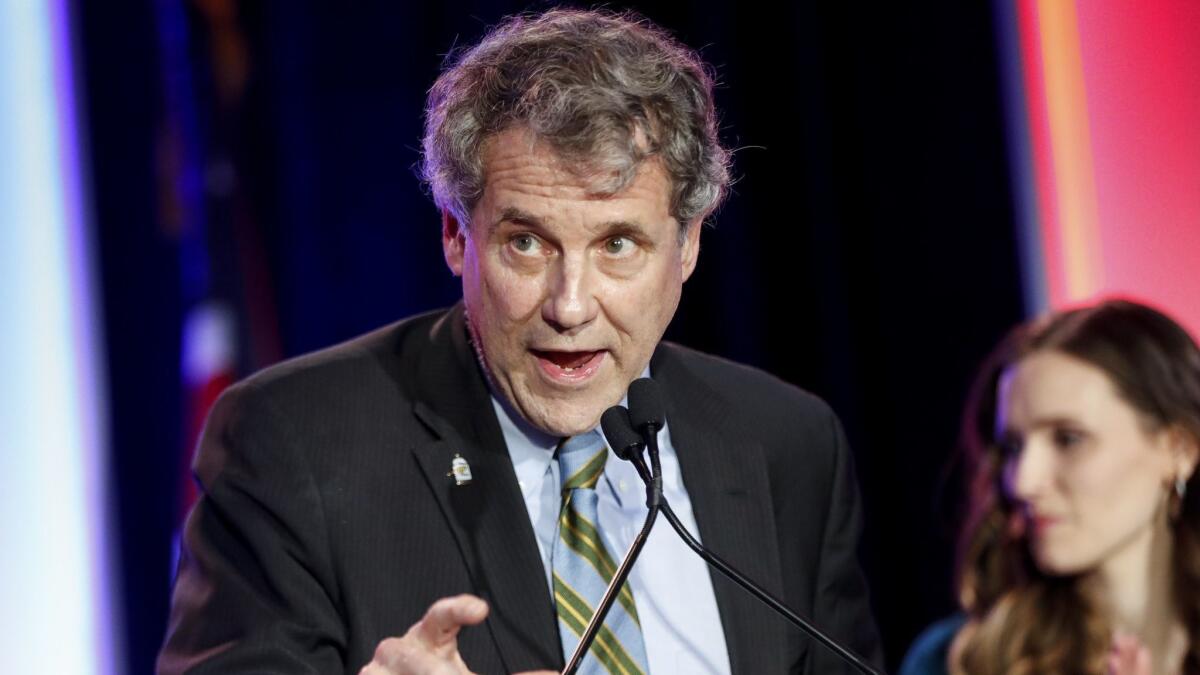Could Ohio Sen. Sherrod Brown win back Trump country — and the White House — for Democrats?

- Share via
Reporting from Washington — There has been a lot of buzz around Ohio Sen. Sherrod Brown since election day.
The unabashed progressive cruised to a third term in a state where Democrats are struggling to stay relevant, one that President Trump carried strongly two years ago. And he did so on a night on which some other candidates popular with the party’s left fell short.
On Monday, Brown told Ohio reporters that he’s seriously weighing a run for president.
“What I hope comes out of my election is a road map for Democrats,” Brown said in an interview Monday. “You can win as a progressive decisively in a state Trump won by double-digits by speaking to the dignity of work. These are appeals Democrats and Republicans all over the country pay attention to and respond to.”
There are a number of reasons Brown could be an attractive candidate for Democrats. His success in Trump country is the obvious one. But Brown’s emphasis on the value of work and the right to earn a middle-class living has made him popular among moderates in the Democratic Party, even as he is fully embraced by the left.
Brown, who turned 66 last week, says he won’t decide whether to mount a run for the White House until after taking some time to discuss it with his family over the holidays. In the meantime, however, he is laying out why he thinks he has hit on a winning formula for Democrats – whether the candidate is him or someone else.
“I’d look at my campaign in many ways as a blueprint not just to govern but to prepare for 2020,” he said.
The latest look at the Trump administration and the rest of Washington »
Long before Trump became a force on the political landscape, Brown was speaking to the concerns of voters in the large swath of the nation where the mothballing of factories has left local economies battered. Washington still can’t relate, he says, even as Democrats champion expanded Social Security, single-payer healthcare, and in some cases, guaranteed income.
The idea of the dignity of work is central to the politics of Brown, a native of Mansfield, Ohio, a struggling industrial town that was once a thriving stronghold of the steel industry. His views were nurtured in local union halls and while working on the family farm.
The conversation on the left, he warns, is not focused where it should be: the erosion of dignity for people who have worked all their lives and now find themselves robbed of the opportunity to live a productive middle class life.
Unlike some other prominent progressives, Brown is skeptical the country will unite behind a campaign that focuses, above all else, on proposals for government expansion.
“I don’t think it’s Medicare-for-all,” he said when asked to describe how he sees the winning message for the party.
“It doesn’t need to be that specifically prescriptive. It is, whose side are you on?,” he said. “Medicare-for-all is a down the road question for a different day.”
“We can talk about Medicare-for-all and all those things, but our focus needs to be legislatively on making the Affordable Care Act work better, dealing with drug company prices, dealing with infrastructure, dealing with job creation,” he said. “When you talk about the dignity of work, part of that is an appreciation for those who have paid into Medicare and Social Security their whole life and now are being undercut.”
“Washington has forgotten that message of the importance of the dignity of work,” he said.
More stories from Evan Halper »
[email protected] | Twitter: @evanhalper
More to Read
Get the L.A. Times Politics newsletter
Deeply reported insights into legislation, politics and policy from Sacramento, Washington and beyond. In your inbox twice per week.
You may occasionally receive promotional content from the Los Angeles Times.











